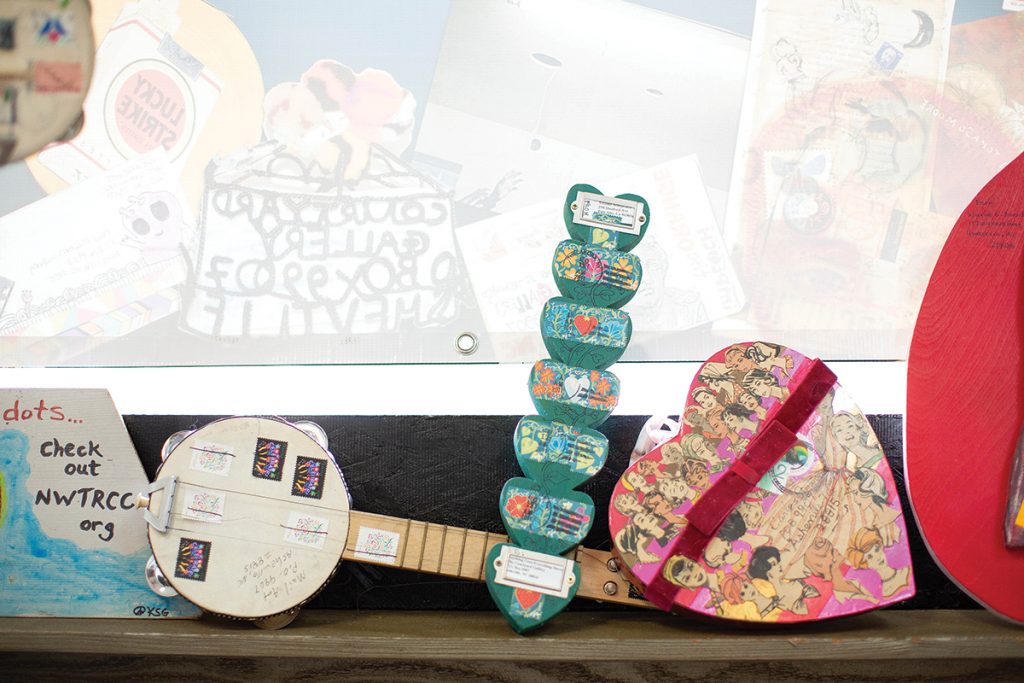
Carlos Steward’s collection of posters from Iran during the ’60s and ’70s will be exhibited at The Flood Gallery in Asheville.
Two years ago, Iranian scholar Hamid Dabahi got a short email from someone he did not know. “I have a collection of over 200 posters from Iran during the ’60s and ’70s and after reading Staging a Revolution, wondered if you would have any need for these images.” Dabahi, a professor at Columbia University, was intrigued. “They appeared quite authentic and rather extraordinary,” Dabai writes in the introduction to his forthcoming book. He replied quickly: “I would love to have copies of these — how may I do so — many thanks for alerting us to this.”
Further correspondence trailed off. He didn’t know then that the email’s author and the owner of the posters had been sent to prison, where emailing was difficult.
Asheville gallery owner and activist Carlos Steward knew he had something significant in his possession. A relative had given him the collection of posters that featured a wide variety of revolutionary images, but they’d sat in climate-controlled storage until Steward remembered them.
“I took them to Sotheby’s first; they said they were worthless,” Steward recalls with a laugh. Their Arabic expert was gone for the day, he says, and an intern had browsed the posters instead. “I thought maybe something was wrong with that analysis.”
That’s when Steward emailed Dabahi, who he found through Internet research, and set into motion three years’ worth of events that culminate with the upcoming exhibit “In Search of Lost Causes: Images of the Iranian Revolution: Paradox, Propaganda and Persuasion.” The N.C. Humanities Council awarded a grant to bring Dabahi to Asheville in May, where he met Steward and Jolene Mechanic of Flood Gallery, and where Dabahi studied the posters in person.
Steward runs the Courtyard Gallery, which started in San Miguel de Allende, Mexico and has had space in downtown Asheville, before settling into its current home. He’s also a conscientious objector to military taxation, has put his own questioning into action, at personal peril. He wouldn’t pay taxes to support the portion of the budget allocated to the military. And so, two years ago, “I went to prison,” he says.
He spent two years in Alabama for his refusal, and when he was released, came back to Asheville and restarted Courtyard in the Phil Mechanic Building. He speaks softly but with confidence, and points to a cabinet full of mail he received while in prison, “showing solidarity with someone who wouldn’t pay for war,” he says.
In mid-October, Steward’s collection will be on display at the Flood Gallery. After its opening in Asheville, the collection will travel to New York, London, Dubai, Los Angeles and San Francisco.
“Especially right now, this is an important exhibit,” Steward explains while leafing through the posters. Along with the faces of the executed, there are messages of feminism (“Not a Single Great Movement of the Oppressed in the History of Mankind has Been Able to Do Without the Participation of Women”), civil rights (“Long Live the Struggle of the Black People for Emancipation”) and worker solidarity (“Iranian Workers, Unite”).
The fact that the posters portray such a variety of transcendent themes doesn’t surprise Steward, who’s studied revolutionary culture in many countries, such as Chile, Nicaragua, Panama and Colombia. Iran and its history are very different than the portrayal they receive from the current U.S. media, Steward says.
“Iran was a Persian country, a center for art and culture and literature,” Steward explains. It’s historically Zoroastrian — militant Islamism crept in later.
“Lost Causes” challenges its viewers to reexamine what they know of Iranian history, and Steward hopes the show will lead to a greater shift. “Hopefully, the people who see this show will ask themselves questions,” Steward says. “Can we believe what our government tells us? Can we believe the portrayal of international events in the media?”
The curators of “Lost Causes” hope the show, and the films and photography that will accompany the poster images, will educate viewers and help facilitate their own personal questioning.
When the government spends most of its money on the military, the public suffers, Steward says. “Our country is so horribly educated about international issues, it’s easy for politicians to push our buttons,” he says. Keeping the populace ignorant keeps them controlled, he says. “They know what they’re doing, but we’ve got to get smarter,” Steward says.
Steward came into possession of the posters through a relative, though how that relative acquired them remains mysterious, he says. It’s certainly true that the existence of the posters is remarkable — pulling them down and saving them would have been an offense punishable by death in Iran, Steward says.
“You’d have been shot on sight,” he says. Then the posters would’ve had to be smuggled out of the country, not an easy thing. They’re in remarkable shape for the journey.
“The exhibition of these posters…will mark a turning point in the modern history of revolutionary iconography from around the globe,” writes Dabahi.


